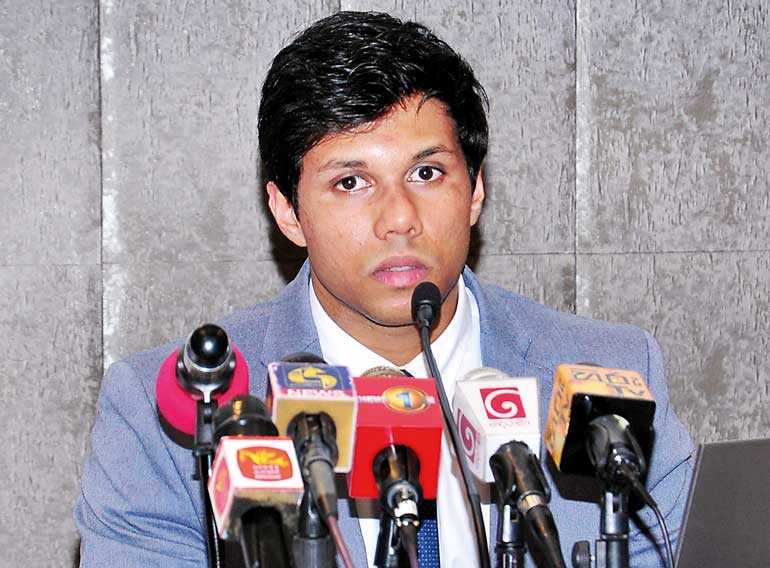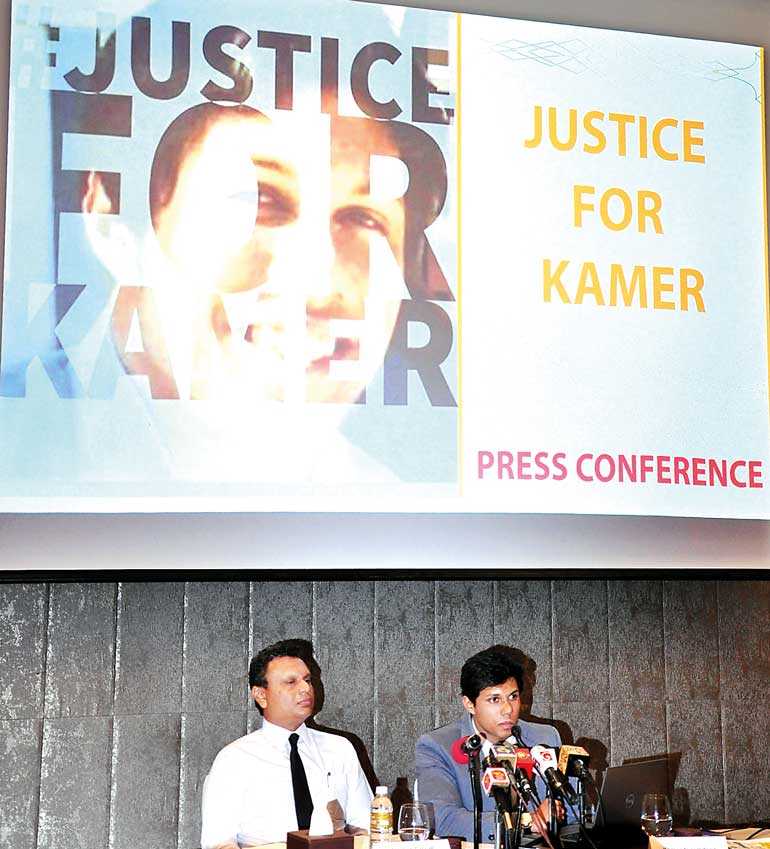Monday Feb 16, 2026
Monday Feb 16, 2026
Thursday, 8 November 2018 00:00 - - {{hitsCtrl.values.hits}}

Kamer Nizamdeen
By Ayesha Zuhair
Sri Lankan national Kamer Nizamdeen, who returned to Colombo on Monday after all terrorism-related charges filed against him in Australia were dropped, yesterday criticised the Australian authorities for causing “irreparable damage which cannot be quantified in any manner.”
He also pledged to speak up for other victims of injustice at every opportunity in the future.
Addressing the media in Colombo, Nizamdeen said: “This whole saga has ruined my future and I have returned to Sri Lanka to carry on with my life. The ordeal has left me shattered and all I can think of right now is to raise my voice and stand in support of other victims of injustice who stand wrongfully accused by any system.”
His lawyer, Farman Cassim, said that legal action will be taken to redress Nizamdeen’s grievances once his client’s costs’ application is taken up for hearing on 23 November. While praising the Australian judicial system for exonerating him, Nizamdeen criticised the conduct of the Australian Federal Police (AFP) as “immature, unprofessional, embarrassing and biased”.
“I strongly believe this happened because I am an Asian on a student visa and the AFP, led by detective Darrine Eljarrar, had the wrong impression that I did not have the resources and the capability of defending my innocence,” he said.

“After I was charged and incarcerated, my only consolation was having faith in the Australian judicial system – a completely independent body to the AFP – in doing the right thing and recognising my innocence. The only evidence was the notebook which was supposedly found by a colleague and was not in my possession at the time of discovery as well as being discovered in an office space on a different floor where I had not been working in for nearly a month,” Nizamdeen pointed out.
“Following eight hours of questioning, detective Eljarrar thought it fit to charge me under Australia’s terrorism laws – draconian I might add – very well knowing the seriousness of these charges and implications. This was after I had denied the handwriting to be mine from the inception,” he explained.
“The consequence of this charge under these laws, which detective Eljarrar was aware of as he chose to act upon the flimsy evidence, is that it is an AA category confinement, which is the highest category in Australia. It means no free access to lawyers and family. It took six days for my lawyers to contact me. The confinement was in solitary confinement in a supermax prison, which is reserved for terrorists and murderers. I had no contact with the outside world for six days, which is a violation of basic human and fundamental rights. It was nearly a month until my family was able to make contact with me. The AFP, New South Wales Police (NSWP) and the authorities are responsible for unpardonable conduct and the irreparable damage which cannot be quantified in any manner,” he stressed.
Nizamdeen further explained that the AFP had the legal obligation to detain him without charge for 14 days and further investigate the incriminating handwriting, which was more than enough time to clarify that the handwriting was not his.
“From media sources, we have come to know that Arsalan Khawaja is a person of interest. He was one of my supervisors at University of New South Wales (UNSW). The line of investigation now is that Arsalan Khawaja was the person who either manufactured or is the producer of the document with the incriminating content. What is more surprising now is that the evidence is the same but the person of interest, namely Arsalan Khawaja has not been charged and locked up in a supermax and then investigated like what was done to me. He has only been named as a person of interest and his house has been raided. Therefore, on the same piece of evidence, there are two differing investigation processes,” Nizamdeen asserted.
“The terror content in the said document is of [a] grave and frightening terror nature aimed at assassinating former Australian Prime Minister Malcom Turnbull and Julie Bishop, as well as to bomb and blow up Sydney Harbour and the Opera House,” Nizamdeen stated.
“Furthermore, the incriminating content had very descriptive details of terrorist activities, which establishes that the manufacturer of this document has definite knowledge of terror activities and is still at large, being a danger and threat to the lives of Australians, especially to my colleagues and students at UNSW,” he added.
Nizamdeen was attached to UNSW at the time of his arrest in Sydney on 30 August. He was enlarged on bail on 28 September after nearly four weeks in a high-security prison when the sole piece of evidence against him, the handwriting in a notebook, was found to be “inconclusive”. All charges against him were dropped on 19 October when it became apparent to the authorities that Nizamdeen had been framed.
Nizamdeen’s Attorney Farman Cassim opined that Australia’s counterterrorism laws were even worse than Sri Lanka’s Prevention of Terrorism Act (PTA), and that there was a clear bias in the implementation of the laws, as was evidenced in his client’s case.
Pix by Sameera Wijesinghe